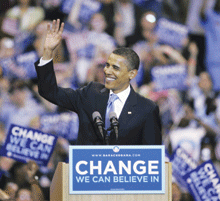 An era of ‘anti-intellectualism’ has come to an end in the United States after Barack Obama’s election as its next president, sector experts say after the historic result of November. But as the euphoria surrounding Obama’s victory has begun to subside, they warn that budget constraints may limit his impact on higher education. “We’re going to have an administration that values knowledge and research,” says Jerry Israel, former president of the University of Indianapolis and now a consultant who worked for the Obama campaign.
An era of ‘anti-intellectualism’ has come to an end in the United States after Barack Obama’s election as its next president, sector experts say after the historic result of November. But as the euphoria surrounding Obama’s victory has begun to subside, they warn that budget constraints may limit his impact on higher education. “We’re going to have an administration that values knowledge and research,” says Jerry Israel, former president of the University of Indianapolis and now a consultant who worked for the Obama campaign.
Once he takes office, the new president — with the support of a Democrat-controlled Senate — is predicted to loosen the restrictions on stem-cell research that were imposed by President George Bush and the Republicans. And research universities are expected to undertake a national crusade to develop alternative energy sources.
Obama’s election pledges on education focused largely on primary and secondary schools, including early-childhood development. But he pledged to double federal spending on university research, introduce a $4,000 (Rs.1.88 lakh) tax credit to offset tuition fees for students who carry out 100 hours of public service, and increase student grants.
Near the end of his campaign, Obama began to caution that the multibillion-dollar bailout of banks, insurance companies and financial services firms, and the resulting budget deficit will limit how much there is to spend elsewhere. “I think they’re going to come up against hard reality,” says David Breneman, director of the Masters degree in public policy at the University of Virginia and its former dean of education. “For good or evil, the higher education portion of the federal budget is in the discretionary column. The $4,000 tax credit is very expensive. I think that will get pushed aside.”
On tuition grants, Dr. Breneman says: “There might be modest moves, but I wouldn’t look at any large increase. That would tend to be my forecast overall — that we’re not going to see anything dramatic in higher education.”
Yet university students are likely to remain engaged in the political process, experts predict. Hundreds of thousands took part in the Obama campaign, reversing the campus apathy of previous years. “I’m old enough to have been in the same age bracket when JFK was elected, and I see a lot of parallels,” says Breneman.
Global faculty pay study
The salaries of academics in higher education vary markedly from country to country, says a new American study. Its analysis of faculty pay across 15 countries shows that average earnings of academics are five times higher in Saudi Arabia, which pays highest salaries, than in China, which pays worst. The disparity is all the more significant as the figures are calculated to take costs of living into account, making pay scales directly comparable.
The average monthly salary ranges from $1,182 (Rs.56,740) in China to $6,611 (Rs.3.18 lakh) in Saudi Arabia. The international average is $4,050 per month (Rs.1.94 lakh). In Canada, the US, Australia and New Zealand, academics are better paid than they are in the UK (average $4,345). The study conducted by the Centre for International Higher Education at Boston College, USA places Indian academics slightly above China in terms of average remuneration. According to it, Indian academics are paid an average $1,547 (Rs.74,250) monthly.
Salaries of entry-level lecturers vary from $682 per month in China, at the bottom of the scale, to $5,206 in Canada, at the top, while the UK average is $3,345. Salaries for top-level academics vary from a high of $8,490 per month in Saudi Arabia to a low of $1,845 in China.
“If salaries at home cannot compete with overseas employment offers, brain drain will continue to beleaguer many already struggling poorer nations,” the report warns. However, it also says that academic earnings in some more developed countries are not much higher than the average income across all sectors. It says that this also risks driving top talent away from careers in higher education.
Comments Philip Altbach, director of the Center for International Higher Education and one of the report’s authors: “We were surprised to find that in all the countries included (in the survey), the full-time professoriate could live on their academic salaries. We also learnt that salaries are, in many countries, only part of the compensation of academics — consulting, special research payments and allowances of various kinds add to remuneration, but we had no way of including such payments.”
(Excerpted and adapted from Times Higher Education Supplement)